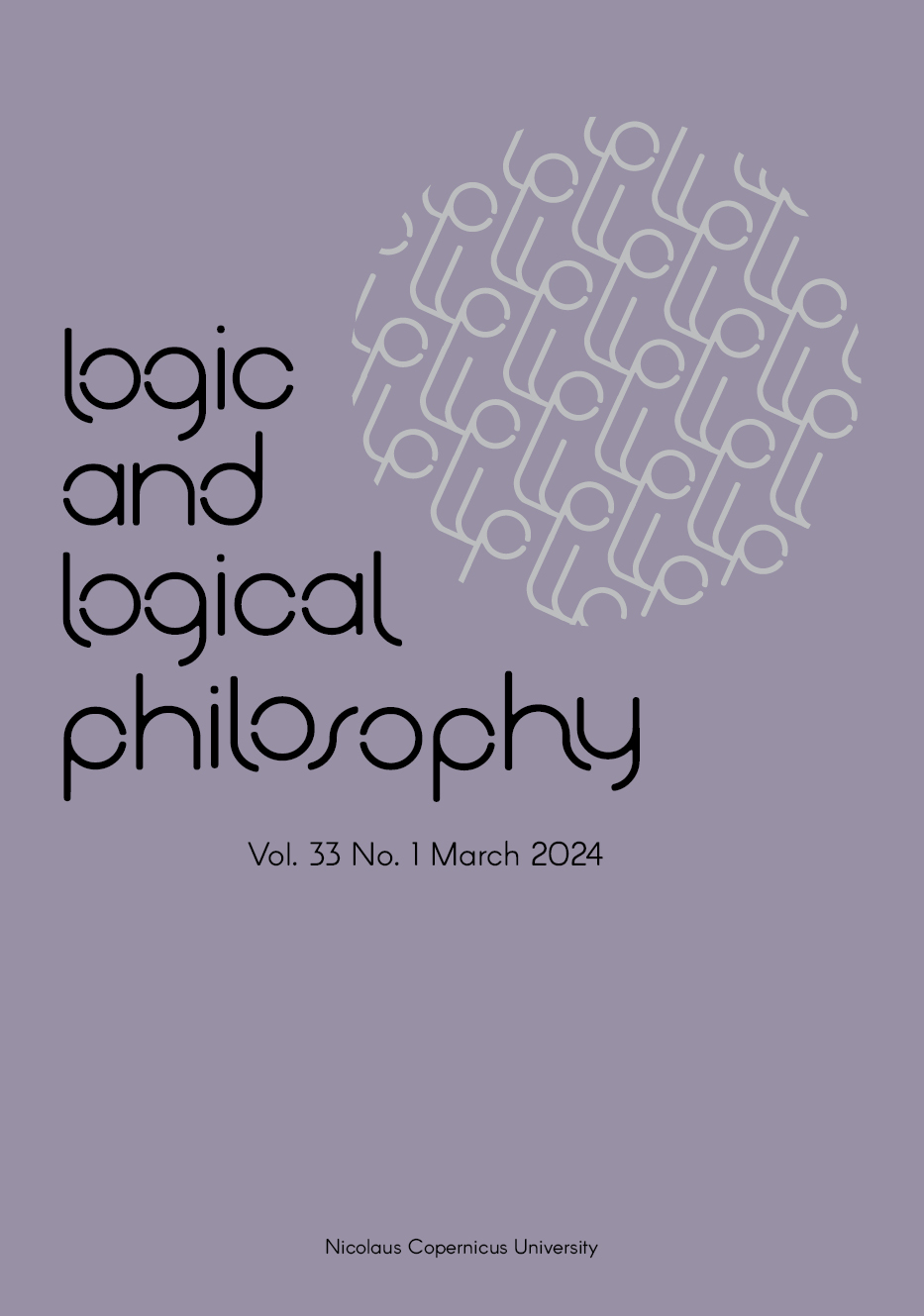Procedural Semantics and its Relevance to Paradox
DOI:
https://doi.org/10.12775/LLP.2023.015Keywords
procedural semantics, truth, liar paradox, Curry’s paradoxAbstract
Two semantic paradoxes, the Liar and Curry’s paradox, are analysed using a newly developed conception of procedural semantics (semantics according to which the truth of propositions is determined algorithmically), whose main characteristic is its departure from methodological realism. Rather than determining pre-existing facts, procedures are constitutive of them. Of this semantics, two versions are considered: closed (where the halting of procedures is presumed) and open (without this presumption). To this end, a procedural approach to deductive reasoning is developed, based on the idea of simulation. As is shown, closed semantics supports classical logic, but cannot in any straightforward way accommodate the concept of truth. In open semantics, where paradoxical propositions naturally ‘belong’, they cease to be paradoxical; yet, it is concluded that the natural choice—for logicians and common people alike—is to stick to closed semantics, pragmatically circumventing problematic utterances.
References
Behmann, H., 1931, “Zu den Widersprüchen der Logik und der Mengenlehre”, Jahresbericht der Deutschen Mathematiker-Vereinigung, 40: 37–48.
Burgess, J. P., 1986, “The truth is never simple”, The Journal of Symbolic Logic, 51 (3): 663–681. DOI: http://dx.doi.org/10.2307/2274021
Dummett, M., 1981, Frege: Philosophy of language, Harvard University Press.
Dummett, M., 1982, “Realism”, Synthese, 52 (1): 55–112. DOI: : http://dx.doi.org/10.1007/BF00485255
Dummett, M., 1991, The Logical Basis of Metaphysics, Harvard University Press.
Duží, M., B. Jespersen and P. Materna, 2010, Procedural Semantics for Hyperintensional Logic: Foundations and Applications of Transparent Intensional Logic, volume 17, Springer Science & Business Media.
Eder, G., 2019, “Truth, paradox, and the procedural conception of Fregean sense”, pages 153–168 in Philosophy of Logic and Mathematics, De Gruyter.
Field, H., “Saving the truth schema from paradox”, 2002, Journal of Philosophical Logic, 31 (1): 1–27. DOI: http://dx.doi.org/10.1023/A:1015063620612
Field, H., 2003, “A revenge-immune solution to the semantic paradoxes”, Journal of Philosophical Logic, 32 (2): 139–177. DOI: http://dx.doi.org/10.1023/A:1023027808400
Gupta, A., 1982, “Truth and paradox”, Journal of Philosophical Logic, 11 (1): 1–60. DOI: http://dx.doi.org/10.1007/BF00302338
Gupta, A., and N. Belnap, 1993, The Revision Theory of Truth, Mit Press. DOI: http://dx.doi.org/10.7551/mitpress/5938.001.0001
Herzberger, H., 1982, “Naive semantics and the liar paradox”, The Journal of Philosophy, 79 (9): 479–497. DOI: http://dx.doi.org/10.2307/2026380
Horty, J., 2007, Frege on Definitions: A Case Study of Semantic Content, Oxford University Press.
Kleene, S. C., 1938, “On notation for ordinal numbers”, The Journal of Symbolic Logic, 3 (4): 150–155. DOI: http://dx.doi.org/10.2307/2267778
Kripke, S., 1976, “Outline of a theory of truth”, The Journal of Philosophy, 72 (19): 690–716. DOI: http://dx.doi.org/10.2307/2024634
Leitgeb, H., 2007, “What theories of truth should be like (but cannot be)”, Philosophy Compass, 2 (2): 276–290.
McGee, V., 1985, “How truthlike can a predicate be? A negative result”, Journal of Philosophical Logic, 14 (4): 399–410. DOI: http://dx.doi.org/10.1007/BF00649483
Moschovakis, Y. N., 1994, “Sense and denotation as algorithm and value”, Lecture Notes in Logic, 2: 210–249.
Moschovakis, Y. N., 2006, “A logical calculus of meaning and synonymy”, Linguistics and Philosophy, 29 (1): 27–89. DOI: http://dx.doi.org/10.1007/s10988-005-6920-7
Muskens, R., 2005, “Sense and the computation of reference”, Linguistics and Philosophy, 28 (4): 473–504. DOI: http://dx.doi.org/10.1007/s10988-004-7684-1
Prior, A. N., 1960, “The runabout inference-ticket”, Analysis, 21 (2): 38–39. DOI: http://dx.doi.org/10.1093/analys/21.2.38
Raclavský, J., 2014, “Explicating the notion of truth within transparent intensional logic”, pages 167–177, Chapter 12, in Recent Trends in Philosophical Logic, Trends in Logic, Springer. DOI: http://dx.doi.org/10.1007/978-3-319-06080-4_12
Ramsey, F. P., 2000, “General propositions and causality”, pages 237–257 in R. B. Braithwaite (ed.), The Foundations of Mathematics and other Logical Essays, Routledge.
Russell, B., 1906, “Les paradoxes de la logique” Revue de métaphysique et de morale, 14 (5): 627–650.
Suppes, P., 1980, “Procedural semantics”, pages 27–35 in Language, Logic, and Philosophy: Proceedings of the 4th International Wittgenstein Symposium.
Suppes, P., 1982, “Variable-free semantics with remarks on procedural extensions”, in T. W. Simon and R. J. Scholes (eds.), Language, Mind, and Mrain, Psychology Press.
Tichý, P., 1969, “Intension in terms of Turing machines”, Studia Logica, 24: 7–25. DOI: http://dx.doi.org/10.1007/BF02134290
Tichý, P., 1971, “An approach to intensional analysis”, Noûs, 5 (3): 273–297. DOI: http://dx.doi.org/10.2307/2214668
Tichý, P., 2004, Pavel Tichý’s Collected Papers in Logic and Philosophy, Otago University Press.
Yablo, S., 1985, “Truth and reflection”, Journal of Philosophical Logic, 14 (3): 297–349. DOI: http://dx.doi.org/10.1007/BF00249368
Yablo, S., 1993, “Paradox without self-reference”, Analysis, 53 (4): 251–252. DOI: http://dx.doi.org/10.1093/analys/53.4.251
Downloads
Published
How to Cite
Issue
Section
License
Copyright (c) 2023 Elbert Booij

This work is licensed under a Creative Commons Attribution-NoDerivatives 4.0 International License.
Stats
Number of views and downloads: 1334
Number of citations: 0







